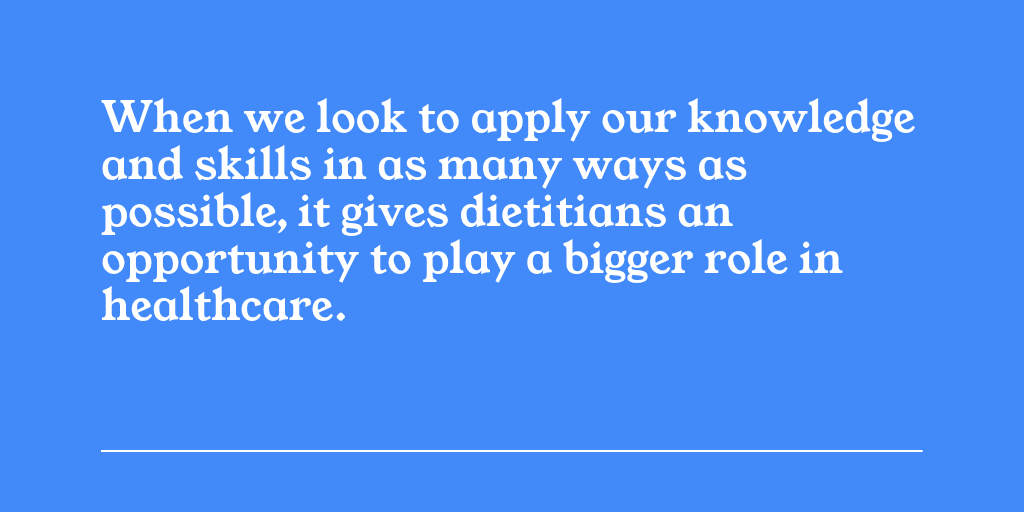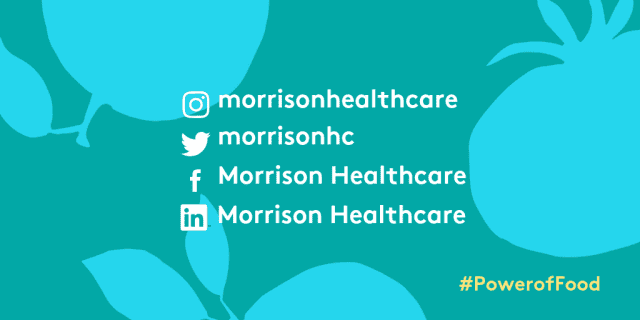Registered Dietitian Nutritionist Day Spotlight: Kathy Irwin
March 13 is Registered Dietitian Nutritionist Day, which commemorates the dedication of RDNs as advocates for advancing the nutrition status of Americans and people around the world. When we asked Morrison Healthcare dietitians to nominate someone who they believe is achieving this goal, Kathy Irwin, a clinical nutrition manager at Methodist Medical Center in Oak Ridge, Tenn., was at the top of the list.
How Kathy Irwin Changed the Way Dietitians Treat Malnutrition
Many people across the nation suffer from malnutrition. Kathy Irwin decided to do something about it.
During the past three years, she has led the charge to help improve patients’ lives by changing the way dietitians in East Tennessee diagnose and bring patients back to good health.
Shortly after arriving at Methodist Medical nearly four years ago, Kathy received training from the Academy of Nutrition and Dietetics on how to perform a Nutrition-Focused Physical Exam (NFPE) – in effect, a more comprehensive physical exam on patients to determine their nutrition status. It turned out to be a turning point in her career and the lives of her patients.
Up until that point, dietitians’ exams were based mostly on medical records and gathering information by speaking to the patient – but never by touching or feeling different parts of their bodies for problems. Now, her work is helping redefine the role dietitians’ play and the benefits they can provide their patients and hospitals in East Tennessee by improving the lives of their patients and communities.

By touching a variety of muscles and fat stores, they can better determine their health. Kathy learned that people who are malnourished will experience wasting syndrome, a process by which a debilitating disease or environmental factors can cause muscle and fat tissue to “waste” away.
“Most practicing dietitians, especially people like me who are a little older, weren’t trained to do that in our college days,” Kathy says. “But that’s all changed. We’ve found that even patients with a normal weight, or even obese patients, can be malnourished. Their muscles won’t feel strong. By touching their muscles and feeling areas where fat is stored, we are finding many more cases of malnourished patients. It’s made a huge difference.”
Shortly after her initial training in 2016, Kathy decided to take a stand. She met with a committee made up of hospital administrators, hospitalists and critical care specialists for Methodist Medical Center. She urged that dietitians performing a more thorough physical exam would uncover more cases of malnutrition. While dietitians don’t make a medical diagnosis, they can communicate their findings to a doctor for further action.

The results are bearing out her arguments. Between 2015 and 2018, the percentage of patients diagnosed with malnutrition ate Methodist Medical has tripled. And the number of people diagnosed with this condition in the seven-hospital Covenant Health System has doubled. Kathy’s colleagues say her leadership has significantly changed the way dietitians examine patients.
“We’ve talked several years about the importance of a nutrition-based physical exam, but it didn’t happen until Kathy stepped into a leadership role and put it in front of the rest of the clinical managers,” says Virginia Turner, a regional clinical nutrition manager at the University of Tennessee Medical Center in Knoxville. “She pushed us and proved to us how using this assessment tool can solidify malnutrition.”
The physical exam also has the potential to provide some financial benefits for the hospital. If a patient covered by Medicare is suffering from malnutrition, the hospital may be reimbursed for their treatment. These patients increase a hospital’s costs because many patients have infections, wounds and other health issues. It makes sense for a hospital to receive an increased reimbursement when these patients are accurately diagnosed with malnutrition. In the past three years, Covenant’s reimbursement from Medicare has increased by ten-fold since Kathy and her team of dietitians began their physical exams.
It turns out that Kathy was simply ahead of her time. In 2017, the Commission on Dietetic Registration required that interns be trained in administration a Nutrition-Focused Physical Exam.
Quick Relief for Patients
Many patients suffering from malnutrition have serious diseases, such as cancer. Those with Alzheimer’s disease may sometimes forget to eat. The nutrition-focused exams – and the ability to quickly begin treating patients – is helping improve their lives. Referred to by dietitians as an intervention, undernourished patients usually receive an oral nutrition supplement or diet education that increases their calories and protein.
“When we discover a patient is suffering from malnutrition, we begin to treat them immediately,” Kathy says. One recent patient, a tall man with chronic bowel disease, weighed only 160 pounds when initially diagnosed. After taking supplements and changing his diet, he now weighs a healthy 230 pounds.
“By increasing his protein and encouraging him to closely watch his weight, he’s now well nourished,” Kathy says.
Once Kathy began using physical exams at Methodist, the next step was to spread the word throughout East Tennessee. Megan Minner, a clinical dietitian at Roane Medical Center in Harriman, Tenn., was among those that attended a regional training meeting Kathy organized three years ago.
The all-day session, as well as several visits to Kathy’s hospital, made a significant improvement in Megan’s ability to diagnose malnourished patients. Her exams include a complete review of muscles from head to toes, examining a patient’s temples, collarbone, shoulders, ribs, triceps, hands, quadriceps and calves.
“I examined one person, and their calf muscles felt like jello, and the light bulb went off,” Minner says. “With Kathy’s guidance, I became more comfortable doing a complete exam to determine if a person was malnourished.” Since she has adopted the full physical exam as part of her treatment, the number of people diagnosed with malnutrition at her facility has doubled.
As a result of the program’s success, dietitians were trained in nearly all of the other Covenant hospitals. Covenant also developed a software program that tracks the number of Medicare patients diagnosed with malnutrition. And to make certain all patients receive a comprehensive physical exam, more dietitians have been added to the Covenant staff.

Kathy’s leadership has been recognized among her peers. She is the President-elect of the Knoxville Academy of Nutrition and Dietitians. She was also recognized at the organization’s Outstanding Dietitian for 2018 and is a member of the University of Tennessee Dietitians Internship Advisory and Selection Committee and has been a guest speaker at local colleges and universities and regional dietitian events. She lets her colleagues know they, too, can make a difference.
“When we look to apply our knowledge and skills in as many ways as possible, it gives dietitians an opportunity to play a bigger role in healthcare,” Kathy says. “This will only help hospitals better their communities and improve patient care.”
Want more people stories? Follow our social media platforms!


